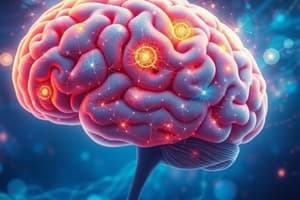Podcast
Questions and Answers
Which hemisphere of the brain is typically associated with language processing?
Which hemisphere of the brain is typically associated with language processing?
- Temporal lobe
- Right hemisphere
- Left hemisphere (correct)
- Frontal lobe
What is a crucial aspect of cognitive processes?
What is a crucial aspect of cognitive processes?
- Creative thinking
- Language processing
- Problem-solving (correct)
- Visual processing
What anatomical shift can occur in the brain as a result of long-term involvement in activities like music?
What anatomical shift can occur in the brain as a result of long-term involvement in activities like music?
- Thicker frontal lobe
- Wider temporal lobe
- More substantial corpus callosum (correct)
- Smaller corpus callosum
Which cognitive function can be enhanced by changes in the brain due to long-term music involvement?
Which cognitive function can be enhanced by changes in the brain due to long-term music involvement?
What phenomenon does music training demonstrate in the brain?
What phenomenon does music training demonstrate in the brain?
Which aspect of brain function is more associated with the right hemisphere?
Which aspect of brain function is more associated with the right hemisphere?
What are the three main areas in which the functions of the human brain can be categorized?
What are the three main areas in which the functions of the human brain can be categorized?
Which brain function is responsible for processing information from our eyes and enabling us to see the world around us?
Which brain function is responsible for processing information from our eyes and enabling us to see the world around us?
Where is the motor cortex located in the brain?
Where is the motor cortex located in the brain?
Which part of the brain is responsible for fine motor control and coordination?
Which part of the brain is responsible for fine motor control and coordination?
Which sensory system helps us identify different scents?
Which sensory system helps us identify different scents?
What role does the cerebellum play in our movements?
What role does the cerebellum play in our movements?
Flashcards are hidden until you start studying
Study Notes
Brain Functions
The human brain is an incredibly complex and fascinating organ, responsible for a myriad of functions that make up our conscious experience. Its functions can be broadly categorized into three main areas: sensory processing, motor control, and cognitive processes. Each of these functions is crucial for our daily lives, allowing us to perceive the world around us, interact with it, and process information.
Sensory Processing
The brain processes sensory information from our eyes, ears, nose, and skin, allowing us to interact with our environment. For example, our visual system processes information from our eyes, enabling us to see the world around us. Similarly, our auditory system processes sounds, allowing us to hear and understand spoken language. Our sense of smell is processed by the olfactory system, helping us identify different scents, and our sense of touch is processed by the somatosensory system, providing us with information about our body's position and movement.
Motor Control
The brain controls our movements and actions through its motor functions. The motor cortex, located in the frontal lobe, is responsible for planning and coordinating our movements. It sends signals to the muscles and nerves, allowing us to move our limbs, speak, and perform other actions. The cerebellum, located at the back of the brain, is responsible for fine motor control and coordination, ensuring that our movements are smooth and precise.
Cognitive Processes
Cognitive functions include memory, attention, perception, and problem-solving. The brain's ability to learn and remember information is a crucial aspect of our cognitive processes. Long-term involvement in activities like music can result in anatomical shifts within the brain, such as a more substantial corpus callosum, which is the neural bridge uniting the brain's two halves. These changes can enhance memory and attention.
The brain's cognitive processes also involve the use of language. The left hemisphere of the brain is typically associated with language processing, allowing us to understand and use spoken and written language. The right hemisphere is more involved in creative thinking and visual processing. The interplay between music and language has profound therapeutic potential, as music training can catalyze neurological transformation, demonstrating the phenomenon of neuroplasticity.
In summary, the brain's functions are varied and complex, allowing us to perceive the world around us, interact with it, and process information. Understanding these functions is crucial for our overall well-being and for developing effective treatments for neurological disorders.
Studying That Suits You
Use AI to generate personalized quizzes and flashcards to suit your learning preferences.




